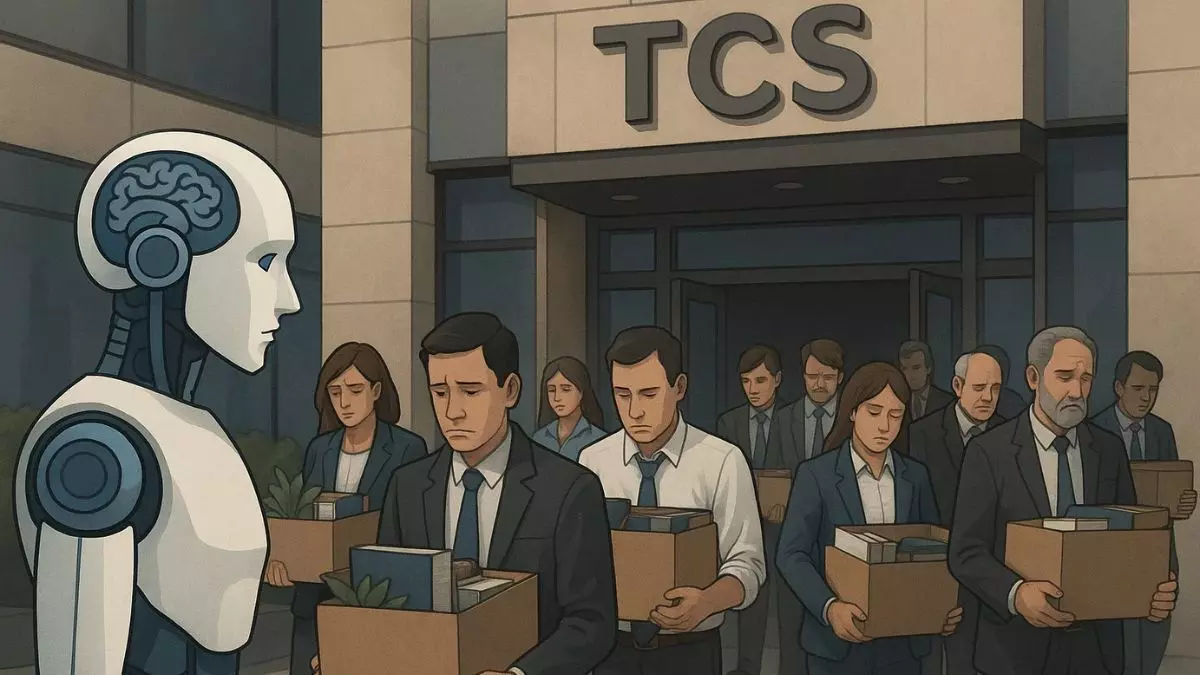
It was the announcement that sent tremors through India’s tech corridors, Tata Consultancy Services, TCS, the country’s largest IT employer and long seen as a bastion of job stability, is letting go of 12,000 employees. That’s 2% of its massive 600,000-strong workforce. What is worrisome are not the numbers alone but the flashing red signal – a wake-up call to an entire industry already facing stiff headwinds due to weakening global demand, shrinking margins, and the disruptive force of artificial intelligence sweeping through traditional IT roles.
Alongside the mass layoff, TCS has also quietly rolled out a hiring freeze for experienced personnel and hit pause on annual salary hikes worldwide illustrating that cost-cutting is no longer optional, it’s survival. According to those close to the matter, onboarding delays for lateral hires now stretch beyond 65 days, and the company has begun phasing out benched staff across Hyderabad, Pune, Chennai, and Kolkata. The new directive being – find a project within 35 days or exit.
Hitting That Panic Button…
Inside the boardrooms of India’s top tech firms, the conversation has shifted. “TCS is too big to ignore,” said one C-suite executive. “And while their structure makes the tremors seem larger, we’ve all been quietly bracing for impact. The AI wave didn’t come unannounced, some of us just pivoted faster.”
Analysts now worry that this could be the tipping point. Brokerage house Jefferies has gone so far as to call it a “canary in the coal mine” moment for Indian IT, an early sign of deeper structural shifts that could trigger widespread job cuts across the sector.
What’s more unsettling is that for decades, TCS wore the label of a ‘sarkari’ IT firm, known for career stability and minimal layoffs. Even back in 2014, when rumors swirled about 25,000 job cuts, the company was quick to douse the fire. The then-chairman Ratan Tata himself was reportedly dismayed at the very idea of mass firings. Back then, involuntary attrition barely touched 1%.
But that was then. This is now and the age of GenAI has little patience for nostalgia. The safe bubble around Indian IT is showing signs of strain, and TCS’s decision may only be the beginning of what could become a sector-wide reckoning.
Frozen Pipelines, Fading Assurances: The Freeze That Follows the Fire
As if the layoffs weren’t jarring enough, TCS doubling down on an immediate freeze on lateral hiring and a global halt on annual salary hikes, in an internal memo, the company cited ongoing political tensions and macroeconomic uncertainty as key reasons for the cautious stance, warning that “long-term stability and sustainability” must now take precedence over routine pay revisions. The outlook may be “positive,” the company claims, but actions suggest otherwise.
Mid-level managers have already been told to brace for sweeping cost cuts. One employee summed it up bluntly: “We’ve been told this is about keeping operations lean. Hiring is on hold across levels – unless absolutely critical.” For a company long seen as a barometer for India’s IT health, this is not a minor weather shift but a climate change.
The shockwaves from the TCS announcement are rippling far beyond its boardroom. The Indian government has reportedly sought clarity on the rationale behind the layoffs and freezes, concerned not just about investor sentiment, but the broader employment ecosystem. And rightly so because this is not limited to just one company but is about a deep, structural reset unfolding across the tech sector.

Look around: 2025 has not been kind to tech workers globally. Amazon, Meta, and Microsoft have all slashed headcounts this year in fresh rounds of layoffs, citing AI-induced efficiencies and margin pressures. Closer home, Wipro and HCLTech have begun ‘silent restructuring’ – a term that now conveniently covers everything from extended bench periods to putting underperformers on notice. Infosys, too, has held back on fresher hiring for several quarters.
This is not the first reset, of course. In 2017, Indian IT weathered a storm when automation and U.S. visa policy changes led to mass layoffs across Infosys, Cognizant, and Wipro. More recently, from 2020 to 2022, COVID-era hiring booms gave way to quiet exits, bench warming, and deferred offer letters. But through it all, TCS had remained an exception – until now.
“The pyramid model is no longer sacred,” says a senior recruiter. “Consulting-led firms like TCS are the most exposed—when your pyramid isn’t AI-ready, it collapses fast.”
Hence, AI isn’t just eating code, it’s dismantling the very architecture of how Indian IT was built – on layered workforces, predictable growth, and human-led execution. Furthermore, hiring has been anaemic across the industry since FY22. Attrition is being allowed to rise, and crucially, there’s little or no backfilling. All because AI tools are filling the gaps faster, and cheaper, than new recruits ever could. “In just the past year, the pace of change in AI tools has been explosive,” says Madan Padaki, tech entrepreneur and startup mentor. “Companies are rethinking their manpower strategies at the core.”
Replicating The Model?
And so, the writing is on the (digital) wall: a shrinking base, a thinning middle, and a growing reliance on automated agents. Even as benched staff in major TCS offices are quietly phased out under the 35-day project rule, the industry is watching and taking notes. One C-suite executive put it bluntly: “What TCS does, the rest eventually follow.”
Whether this is the start of a domino effect or simply the biggest domino to fall yet, India’s IT sector, once seen as immune to mass firings, has entered uncharted territory. And the frost of uncertainty is spreading fast.
Hence, is this just the beginning, when the IT ‘Sarkar’ embraces the sword what is to be expected?
Traditionally, mass layoffs have long been taboo in the Indian IT playbook. Unlike their Western counterparts, Indian tech giants have historically opted for the slow burn – tighter performance reviews, subtle nudges into “improvement plans,” and unspoken exits rather than overt pink slips. It was an unspoken social contract: stability in exchange for loyalty. But TCS’s decision to publicly part ways with 12,000 employees may have shattered that fragile understanding.
And now, the dominos may be lining up.
Already, HCL Technologies has hinted that not everyone will make the AI-era cut. “A good amount of people have been released due to productivity improvements,” CEO C Vijayakumar admitted in a recent post-earnings call. The brutal reality is that some roles are simply obsolete. Automation is replacing entry-level tasks faster than employees can be retrained. And those who don’t fit the new mold are being quietly shown the door.
Wipro’s recent internal memo reportedly calling for English proficiency assessments among senior employees has only added to the paranoia. Officially, it’s “training.” Unofficially, it smells like a performance audit dressed up in corporate lingo and a potential prelude to restructuring. The firm denies any layoff link, but in an environment already charged with fear, semantics offer little comfort.
Welcome to the AI-triggered bloodbath.
Malcolm Frank, former Cognizant executive and now CEO of Talent Genius, pulls no punches: in key IT areas like application development and maintenance, AI could eliminate 30% to 50% of the workforce. That’s not a projection; that’s a structural rewrite. “Those who adapt and learn to manage AI teams will thrive. The rest? They’ll be replaced,” he warns. Frank calls this moment “a reckoning.”
For decades, Indian IT scaled upward, always hiring, always growing. But Schumpeter’s “creative destruction” is finally here and it’s merciless. Companies clinging to legacy models are likely to be left behind. Those who confront the storm, ugly as it may be, might just find a future beyond the churn.
But there’s another side to layoffs that often goes ignored – reputational damage. Cognizant learned this the hard way in 2021. The company’s mass exits didn’t just cut costs but they also ended up eroding trust. As demand rebounded post-Covid, clients came knocking but Cognizant couldn’t answer. They had the contracts, but not the talent to execute them.
This is the paradox TCS now faces. Known for one of the industry’s lowest attrition rates and highest trust scores, it risks burning bridges within its workforce and beyond. Jefferies warns that layoffs could sap morale, trigger a talent exodus, and ironically, lead to the very execution slippages the cost cuts aimed to avoid.
Because once the social contract is broken, the loyalty that built Indian IT won’t be so easy to renew.
The Last BIT,
This is not just about TCS; the entire Indian IT sector is undergoing a seismic shift. AI is not the future, it is the now. With clients demanding higher productivity at lower costs, firms are being forced to deliver more with fewer people. Consulting-led firms, which have long relied on the age-old people pyramid, are feeling the heat. If that pyramid is not AI-ready, it collapses fast.
While 2017 had layoffs driven by visa tightening and 2020–2022 saw silent exits via prolonged benching and offer deferrals, 2025 feels different. This time, it’s the foundation of the Indian IT model that’s being questioned and with automation gobbling up the bottom layer, mid-level roles (once considered safe) are also under threat; the pyramid is not just shrinking; it’s morphing.
What’s worse is the silence. There’s no townhall. No grand memo. Just eerie quiet across offices in Hyderabad, Pune, Chennai, and Kolkata, broken only by whispers of layoffs, onboarding ghosts, and emails that now read like corporate obituaries.
As one senior recruiter bluntly put it: “This is no longer about cost-cutting. It’s about survival in the AI age.”








